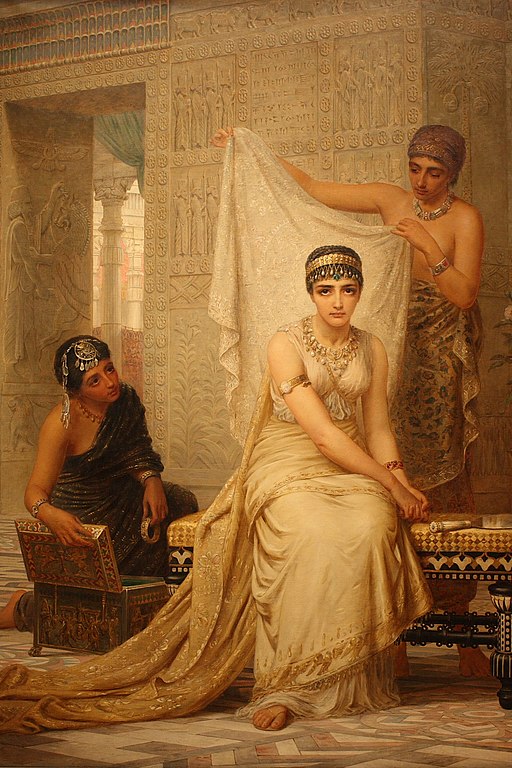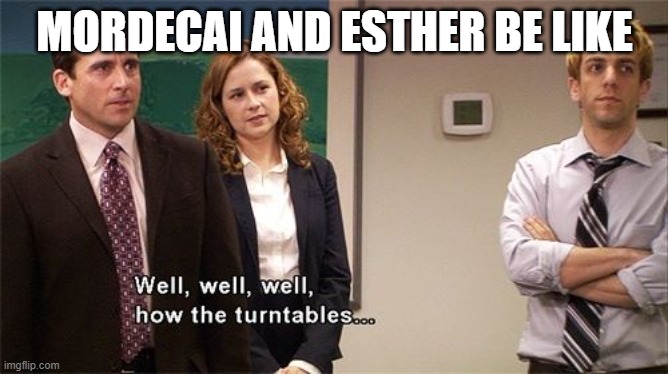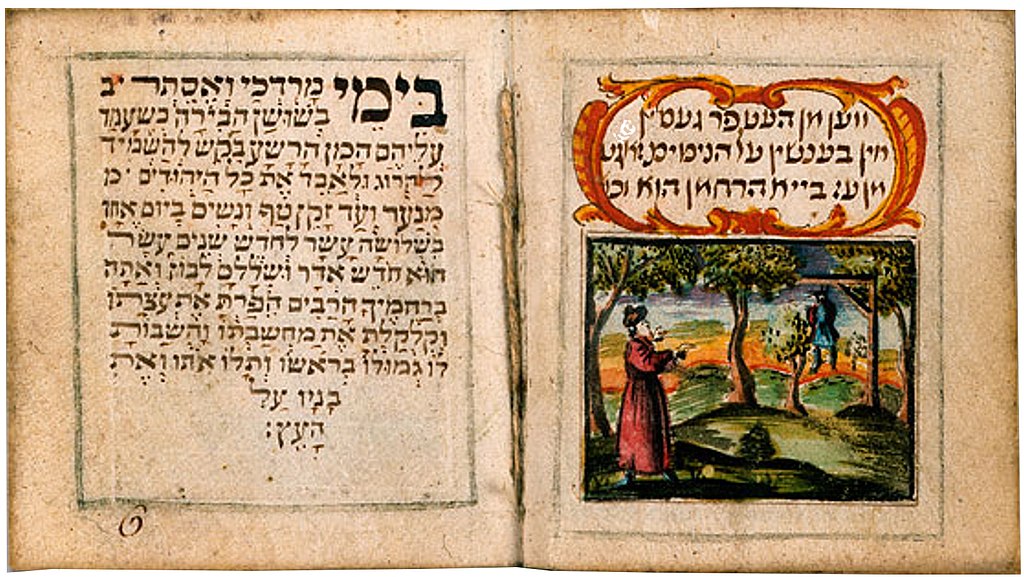What is The Megillah?
Who is this Esther lady in the Book of Esther?
And what is the deal with Purim?
Well gather around as we go through the thrilling background story of Purim (the Festival of Lots), as told in The Megillah! And the cool part? It sounds like a crazy fairy tail (that should really become a Disney movie or have a Netflix adaptation).
So let’s travel back in time, about 2500 years.
Welcome to Shushan, the vibrant and colorful capital of the vast First Persian Empire.
In a magnificent castle built in Shushan, lives a powerful king – King Ahasuerus. From his prestigious castle, Ahasuerus reigns all the way from India to Ethiopia – over 127 provinces in total!
It is the third year of his reign, and Ahasuerus holds a feast . Not your everyday feast though – but a fancy feast for all his princes and his servants; the army of Persia and Media, the nobles and princes of the provinces. This is a celebration like no other, the perfect event to show off his excellent majesty and the riches of his glorious kingdom. So it only makes sense to turn this event to a non stop 180 day long feast.

But you know what they say – there’s no party like an after party. So after this 180 day long feast, Ahasuerus holds a more intimate 7 day feast in his castle, only for all of the citizens of Shushan.
Ahasuerus’s wife, Vashti the queen, also holds a feast for the women in the royal house (which belongs to king Ahasuerus).
On the seventh day of the feast, King Ahasuerus decides it’s time to show off Vashti’s beauty. He orders to bring Vashti the queen before him, with the crown royal, to show the peoples and the princes her beauty.
However Vashti refuses to come. She is more than eye candy, you know. And she deserves to be treated accordingly.
The advisors of Ahasuerus heat things up. They say that Vashti’s refusal wrongs all of the people of all of the provinces of the kingdom. They say that word will get out – the queen refused to follow her husband’s orders – and this will inspire other women to stand up to their husbands.
King Ahasuerus decides that his advisors are right and banishes Vashti, to replace her with a more… obedient model. He issues a decree – all the wives will give honor to their husbands, both to great and small.
Lack confidence, much?
Do you know what time it is? Yes, it’s time for the earliest episode of The Bachelor ever! Our bachelor is a King, with a kingdom of 127 provinces. He seeks a good looking young virgin. He loves long walks on the beach and an obedient significant other.
And so the search begins – Ahasuerus appoints officers in all the provinces of his kingdom, to gather all the fair young virgins unto Shushan the castle, to the house of the women. Then, each young woman will be presented to him, so he can swipe left and right in the comfort of his own throne.
Meet Mordecai. A Jewish man, he used to live in Jerusalem until he was exiled during the Babylon Exile by Nebuchadnezzar, the king of Babylon. Mordecai now lives in Shushan, raising Esther, his uncle’s daughter. When her father and mother perished, Mordecai took Esther in and raised her as if she was his own daughter.
Our Esther ticks all the boxes – she is a young maiden and nice to look at. So she is taken to the house of the women, as a potential match for the king.
Following Mordecai’s instructions, Esther hides the fact that she is Jewish. Remember this, as this will be important soon.
In the house of women, every woman waits for her turn to be presented to the king. When enchanting Esther is finally presented, Ahasuerus is hooked. He loves her so much that he instantly sets the royal crown upon her head, and makes her queen instead of Vashti.
Of course, this calls for a celebration – a feast! Ahasuerus throws Esther’s feast, a great feast unto all his princes and his servants.

All this time, Mordecai waits by the walls and in the king’s gate. He cares for Esther, and wants to make sure she is safe and sound. Luck has it that in the evening of the feast, Mordecai overhears two of the king’s chamberlains, as they plan to assassinate Ahasuerus.
Startled, Mordecai informs Esther, who is now the queen. And Esther tells the plot to the king, in Mordecai’s name.
An inquisition is made of the matter, resulting in the two chamberlains being hanged on a tree.
This incident is written in the book of the chronicles before the king.
Enters the villain of our story – Haman.
For reasons we do not know, Ahasuerus promotes Haman and sets his seat above all the princes that were with him. Not only that, but Ahasuerus commands that everyone bow down, and prostrate themselves before Haman.
And everyone does it. Well, almost everyone, for there is one stubborn man who refuses to do so. And that man’s name? Mordecai.
Haman tries to figure out why Mordecai refuses to bow. The reason? Mordecai’s Jewishness.
Haman is furious. He decides to take action.
If Mordecai refuses to bow due to being Jewish, the easy solution is to kill all the Jews that live throughout the whole kingdom of Ahasuerus. Totally sensible.
Side note:
Why did Mordecai not bow to Haman? The story does not explain why Mordecai’s Jewishness prevents him from bowing down to Haman. The leading approach is that Haman embroidered on his clothing the image of an idol, and this means that Haman basically demanded that Mordecai would bow down to his god. This would be considered idol worship, which is one of the three cardinal sins. That’s it, carry on.
So the plan is clear – kill all Jews. But when should they do it? Apparently this is the hard decision to make.
Do decide, they cast pur, that is, the lot, before Haman, and decide on a date – the 13th day of the Hebrew month Adar. This pur (read like “put” with an “r”) is the reason the holiday is called Purim, which is Hebrew for “lots”.
After selecting the date, Haman tries to convince Ahasuerus that he really should allow Haman to kill all the Jews. He even offers to pay the king’s treasuries ten thousand talents of silver.
Just like the case of Vashti, Ahasuerus hates disrespect and loves punishing all of the people that belong to the same group as the person who disrespect him, so he’s on board quite quickly and easily, and doesn’t even want the money.

Haman gets the green light and the official ring of the king, and starts sending signed letters in the name of the king. Letters are sent to every governor, prince and province – on the 13th of Adar, each and every Jew will be destroyed, slayed, perished, gone. And to clarify, this includes all Jews, both young and old, little children and women, in one day. And to put a cherry on top, the participants can take the spoils of the killed Jews for a prey.
The countdown to annihilation of the Jews begins.
When Mordecai learns of this he is shocked. His actions, his refusal to bow before Haman, are about to bring an end to the Jews of the Persian Empire!
He rips his clothes and wears sackcloth with ashes (these are Jewish mourning customs). Grieving, he breaks down in the middle of Shushan in a loud and bitter cry.
And just like Mordecai, the rest of the Jews learn about their grim fate. In every province, in every city, Jews are mourning, crying, weeping and fasting.
Queen Esther hears about Mordecai. Worried, she sends one of the king’s chamberlains to Mordecai, to ask why he is grieving – as she has not heard of the fate of her people.
Mordecai tells the story to the chamberlain, and sends a begging message to Esther – “please, Esther, go to the king. Ask him to cancel the decree, beg him not kill the Jews. The fate of your people is in your hands!”
Esther now has a dilemma. She needs to go to the king, she has to save her people. But there is a catch – a person has to be called by the king in order to speak with him. If she goes to Ahasuerus without being called, it can go in one of two ways. The first – Ahasuerus holds out the golden scepter, which means she lives. The other – Ahasuerus does not hold out the golden scepter, which means she is put to death.
And the zinger – Esther has not been called to see Ahasuerus for the past 30 days. The odds do not seem to favor her this time.
After some back and forth between Esther and Mordecai (via the poor chamberlain running between them), Esther is convinced. She asks Mordecai that all the Jews of Shushan fast for her, for three nights and three days, and then she will risk her life and go to the king, uninvited.

For three days Esther works on a plan. And on the third day, it’s go time.
She puts on her finest royal apparel, takes a long deep breath, and hesitantly goes before the king. Will she live? Will Ahasuerus hold out the golden scepter?
Ahasuerus looks at her, standing before him.
Esther’s heart is beating like crazy.
It is so silent you can hear a pin drop.
She looks back at him. And luckily, she obtains favor in his sight.
The king holds out to Esther the golden scepter that was in his hand. Yes!!!
Ahasuerus turns to Esther and asks, “Tell me, Esther, what is it you truly desire? For whatever you may request, it will be given to you – up to half of the kingdom”.
All she asks is for the king to invite Haman to a special banquet that she has prepared for him.
And so it was. Haman came to the banquet, during which the king asked Esther again – “Tell me, Esther, what is it you truly desire? For whatever you may request, it will be given to you – up to half of the kingdom”.
And again, all she asks is for the king to invite Haman to another special banquet that she has prepared for him the next day.
Haman is thrilled – two banquets honoring him back to back – that’s quite the achievement! He is full of joy and pride. Well, almost – since he sees Mordecai at the king’s gate. The thorn in his ego. Haman’s wife has another simple solution – she tells Haman to prepare a tall tree, and hang Mordecai from the tree before the second banquet. Easy peasy.
Excited by the simple solution, Haman prepares a tree. A tall tree. ‘Cos why not?
That night, King Ahasuerus tosses and turns, unable to fall asleep. Since TV has not yet been invented, Ahasuerus asks for a bedtime story. So the book of records of the chronicles of the kingdom is read to him.
And amongst these records, a special story resurfaces. One involving Mordecai – and the time he saved our beloved king from assassination.
Intrigued by hearing the story, Ahasuerus is surprised to learn that Mordecai did not receive anything for his deeds. No feast, no prize, no honors. Nothing, nada, zilch.
Ahasuerus is bummed out. How did he let it slide? What shall he do, what shall he do?
At that moment, Haman enters. “Perfect, let’s ask Haman!”.
Ahasuerus asks Haman – “What can be done to delight and glorify the man that the King wishes to honor?”. Naturally, after getting two feasts to honor him, Haman is happy. He thinks he’s getting another party. And since he thinks that he truly deserves the best, he suggests an ostentatious event.
“Well, my King”, Haman says, “You should bring that man royal apparel, one that you wore. And also bring a horse that you rode. And put a crown on that horse as well. It is a royal horse after all. Now, regular delivery will not do. Na-ah. Make your most noble prince deliver the royal apparel and the horse with the crown. And then, after your man is royal-suited up and riding the horse, have that prince walk the horse all over town, calling ‘Thus shall it be done to the man whom the king wishes to honor’”. Boy, Haman sure knows how to honor himself.
Ahasuerus is pleased. He turns to Haman – “Very well, hurry up then. Take the apparel and the horse, and bring them to Mordecai who sits at the gate. And do all the other stuff you said, don’t forget a single thing.”
Well, that was unexpected. So Haman did everything – instead of hanging Mordecai and enjoying a feast, he walked around, with the horse, honoring Mordecai all through the city.
And as if this wasn’t enough, Haman’s wife rubs it in. “If Mordecai is of the seed of the Jews,” she says, “you will surely fall before him.”

Just like that, it was time for Haman’s second feast. Yey…
If you think Haman’s day can’t get any worse, think again.
During the feast, Ahasuerus asks Esther yet again – “Tell me, Esther, what is it you truly desire? For whatever you may request, it will be given to you – up to half of the kingdom”.
Here goes nothing. The last part of Esther’s plan.
She goes for the subtle approach. “If I have found favor in thy sight, and if it pleases the King, my request is that you let me live, me and my people. For we are sold to be destroyed, to perish, to be killed. If we were sold to slavery, I wouldn’t have bothered you, for the villain is not worth damaging the King.”
King Ahasuerus is shocked. “Who is he? Where is this villain that seeks to destroy you?!”
“This villain,” she says, “is this evil enemy – Haman.”
The King is furious. He angrily gets up and goes into the palace garden.
Oh oh. Haman feels the wind has changed. He is about to lose the battle, and perhaps his life. He’s no longer the King’s favorite, is he?
So he falls to the bed on which Esther waited, and begs for his life.
That is a poor choice, for at that exact moment Ahasuerus returns, and he does not like what he sees. “Are you trying to force the queen before me in the house? IN MY HOUSE?!”.
One of the chamberlains makes things even worse for Haman. “Remember Mordecai, who spoke good for you? You know, the one that saved your life, the one you honored this morning? Well, Haman prepared in his house a very tall tree for Mordecai. Just sayin’ you know”.
“Hang Haman on that tree!”, Ahasuerus orders.
And so it was. Haman was hanged on the very same tree he prepared for Mordecai. And the king relaxed.
Ahasuerus is so relaxed, actually, that he gives Haman’s house to Esther (and in turn, she gives it to Mordecai). And the king’s ring that Ahasuerus gave to Haman? It is passed on to Mordecai.

But one issue still remains – the king’s decree. You know, the one ordering to kill all of the Jews on the 13th day of the Hebrew month Adar. Yeah, that decree.
Esther begs Ahasuerus, pleading him to reverse the letters sent by Haman in the king’s name, ordering the people to destroy all Jews.
Well, guess what – it’s the Jews’ lucky day.
King Ahasuerus says: “Haman laid his hands on the Jews. Therefore, I hanged him and gave Esther his house. So go ahead, write whatever you want about the Jews in my name, and seal it with my ring – so it is made official, and no man can reverse it.”
So they did. They wrote letters to every province, every prince, every governor. 127 provinces, each got letters in their own languages, saying that the king had granted the Jews in every city to gather themselves together, and to stand for their life. The Jews are permitted to destroy and kill anyone who would assault them. They are allowed to kill the assaulters, as well as their children and women, and to take the spoil of them for a prey on the 13th day of the Hebrew month Adar.
Basically, it’s the Uno reverse card of decrees.
Now every single person throughout the kingdom knows – on the 13th day of the Hebrew month Adar, the Jews are permitted to go after their enemies.
In every city that received the letters, the Jews rejoiced, celebrated and held feasts.
And the non-Jewish people? Well, they feared their fate. So much, that some even converted to Judaism!
The 13th day of the Hebrew month Adar finally arrived, and it is payback time.
Those who hated the Jews and wanted to kill them, were now ruled over by the Jews. Throughout every city of every province, the Jews laid hands on their oppressors, those who planned to destroy them.
And the governors of the provinces? Well, they just had to play along. They all feared Mordecai, who became the king’s go to guy, his champ, his confidant.
In Shushan alone, the Jews killed 500 haters, including the 10 sons of Haman. However, the Jews took no spoils.
Ahasuerus, quite impressed with these numbers, grants Esther one more wish.
Her request? “Let the Jews of Shushan another day to act by your decree, and let the sons of Haman be hanged from the tree.”
And so it was. The next day the Jews of Shushan killed another 300 haters, and still took no spoils.

All of the Jews outside of Shushan did the killing on the 13th, and rested, celebrated and had feasts on the 14th of Adar.
The Jews in Shushan did the killing on the 13th and 14th, so all of the resting and celebrating and having feasts were pushed back to the 15th of Adar.
That is why Mordecai sends out another bunch of letters, for all the Jews of all the provinces – from now on, every year, the 14th and 15th of Adar are celebratory days. For on these dates, sorrow became happiness, mourning became celebrations, death became life (for Jews, at least…). So these will be days of feasting and gladness, days of sending portions to one another, and gifts to the poor.
And so it was.
The End.
So what did we learn from the story of the Megillah?
In the case of Mordecai, standing up to your principles might be extremely dangerous not only to yourself, but also to everyone else in your group. But also that an act of kindness can go a very very long way.
In the case of Esther, we learned that with great power comes great responsibility. If you have the opportunity to save lives, you have to do it even if you risk yourself.
In the case of Haman, we learned that sometimes you need to learn to let go. Haman had the utmost respect of all the people of Shushan, except one. And that led him to his end.
In the case of Ahasuerus? Well, I guess you can say that politics and decisions are not set in stone. Fates can be determined in a blink of an eye, and people can have a change of heart at any moment.
So to sum up – do random good things, use your power responsibly, let go sometimes and never say never!
Happy Purim everyone!

